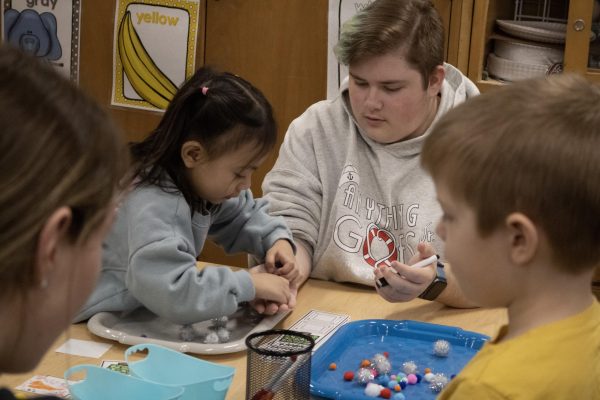Business Incubator course at South mimics real world of business
January 25, 2018
The Business Incubator course at South teaches students how to create a successful business from the passions they have. According to Michael MacFadden, the Business Incubator teacher, this full year elective combines entrepreneurship skills with the opportunity to create a business idea that could have the potential to receive funding from investors.
In the class, students pitch a business idea and then learn how to make it come to life. The ideas are kept “scalable” and “actionable” in order to create a more realistic idea at the beginning level of a high school student, on what the real world experience is like to run a business. MacFadden says that the best ideas are ones that students are the most passionate about.
“You can choose the idea that you think has the best market opportunity,” MacFadden said. “[For example], if [you] could create the next Facebook, [you’d] have riches beyond [your] wildest dreams. That could present a challenge if you’re not really passionate about creating the next big social network. The idea is going to fizzle out. But if you’re really interested in [something like] snowboarding, then building a business in that space won’t feel like work. It’s going to feel like the thing you want to do the most.”
Seniors Drew Gonzalez and Dylan Garvey carried that advice into creating their own business called “One Stop Lacrosse” that caters to individuals across Glenview and to nearby park districts. The company rents lacrosse equipment to beginning players in order to lessen the price tag on trying out the sport. According to Garvey, both Gonzalez and Garvey have experience in lacrosse and were interested in creating a business revolving around their hobby.
“I was inspired to start a business because I thought it would be fun and I also wanted [to] be my own boss and [have] something to call my own,” Garvey said. “The business started because I have played lacrosse my whole life and Drew played until sophomore year, so it was something we were passionate about.”
According to Garvey, the class also has opportunities for high school entrepreneurs by presenting ideas in front of businessmen and women to deepen the students’ understanding of the world of business.
“The class helps with speaking skills, working with others and lets students hear from business professionals as well as talk to them and creating connections,” Garvey said. “From this experience I have [been] able to back up my business and reasoning behind the things we do and it really helped to go through that experience.”
In addition to speaking to business professionals, the class uses real world issues and aims to create solutions that consumers would be willing to pay for, according to MacFadden.
“One of the key reasons [that students should take the class] is [because] students are learning problem solving and problem identification,” MacFadden said. “Teaching students how to build a business is also giving them a framework to approach any challenges they face in the future, whether it be in a business scenario, work or life.”
Junior Lily Dolan’s business, BestFit, is a website that helps find the user’s best fitting men’s dress shirt on Amazon. Dolan described how the class’s focus on startup business was appealing to her because of the variety of business-related skills students could try.
“We have learned how to pitch [and] how to draft a business model [in addition to] some marketing tips and website development skills,” Dolan said. “If you want to do business but are not sure of what specifically, starting a business can help because you are essentially working on marketing, web development, supply chain, accounting and [much] more. Instead of having to choose a specific career, [you] can do a bit of everything.”
MacFadden described how the class is predicated upon a methodology called Lean Methodology, which is the traditional framework for building a business and covers a wide variety of skills. MacFadden says that Lean Methodology helps carry his student’s businesses past South.
“We have students that have gone through the process of doing a provisional patent search that are now working with a patent attorney [and other students] who are in the process of filing paperwork to form a LLC [Limited Liability Company],” MacFadden said. “These are real authentic things that students are going to be able to bring with them into the real world.”













